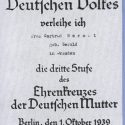Caja Rude’s father, a stationmaster, left her mother and eight children when Caja Rude was eight years old. After a short period of schooling, she became a domestic servant, later becoming a student at the music conservatory, and she earned a living as a silent film pianist, social worker, and journalist, marrying in 1907.
She made her debut in 1929 with Skyggebilleder (SS), followed by an extensive production of novels for adults and young ladies. Life as a working woman and working-class woman forms the core of her works, such as in Kravet, 1931. Her best known work is Kammerat Tinka, 1938, about the women in a family who stick together to assert the right of girls to education, knowledge, and work at a factory. She wrote for the paper Social-Demokraten and was an opponent of legal abortion and sexual liberation, which she believed jeopardised the cohesion of the working-class family.


